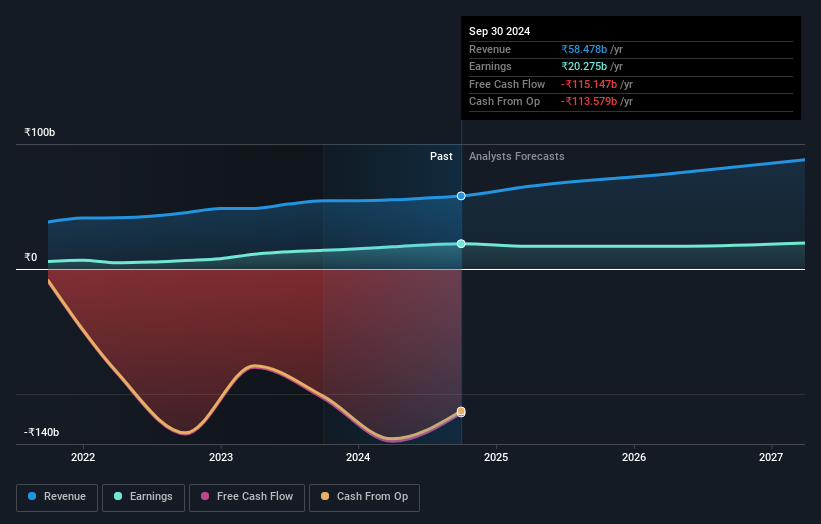State or government among The Jammu and Kashmir Bank Limited's (NSE:J&KBANK) largest shareholders, saw gain in holdings value after stock jumped 6.3% last week

Key Insights
- The considerable ownership by state or government in Jammu and Kashmir Bank indicates that they collectively have a greater say in management and business strategy
- The largest shareholder of the company is Government of Jammu and Kashmir with a 55% stake
- Institutions own 11% of Jammu and Kashmir Bank
To get a sense of who is truly in control of The Jammu and Kashmir Bank Limited (NSE:J&KBANK), it is important to understand the ownership structure of the business. We can see that state or government own the lion's share in the company with 60% ownership. Put another way, the group faces the maximum upside potential (or downside risk).
As a result, state or government were the biggest beneficiaries of last week’s 6.3% gain.
Let's delve deeper into each type of owner of Jammu and Kashmir Bank, beginning with the chart below.
View our latest analysis for Jammu and Kashmir Bank

What Does The Institutional Ownership Tell Us About Jammu and Kashmir Bank?
Institutional investors commonly compare their own returns to the returns of a commonly followed index. So they generally do consider buying larger companies that are included in the relevant benchmark index.
As you can see, institutional investors have a fair amount of stake in Jammu and Kashmir Bank. This can indicate that the company has a certain degree of credibility in the investment community. However, it is best to be wary of relying on the supposed validation that comes with institutional investors. They too, get it wrong sometimes. It is not uncommon to see a big share price drop if two large institutional investors try to sell out of a stock at the same time. So it is worth checking the past earnings trajectory of Jammu and Kashmir Bank, (below). Of course, keep in mind that there are other factors to consider, too.

Jammu and Kashmir Bank is not owned by hedge funds. The company's largest shareholder is Government of Jammu and Kashmir, with ownership of 55%. With such a huge stake in the ownership, we infer that they have significant control of the future of the company. In comparison, the second and third largest shareholders hold about 4.2% and 2.9% of the stock.
While studying institutional ownership for a company can add value to your research, it is also a good practice to research analyst recommendations to get a deeper understand of a stock's expected performance. There is some analyst coverage of the stock, but it could still become more well known, with time.
Insider Ownership Of Jammu and Kashmir Bank
While the precise definition of an insider can be subjective, almost everyone considers board members to be insiders. The company management answer to the board and the latter should represent the interests of shareholders. Notably, sometimes top-level managers are on the board themselves.
I generally consider insider ownership to be a good thing. However, on some occasions it makes it more difficult for other shareholders to hold the board accountable for decisions.
We can see that insiders own shares in The Jammu and Kashmir Bank Limited. The insiders have a meaningful stake worth ₹1.4b. Most would see this as a real positive. It is good to see this level of investment by insiders. You can check here to see if those insiders have been buying recently.
General Public Ownership
The general public, who are usually individual investors, hold a 28% stake in Jammu and Kashmir Bank. While this size of ownership may not be enough to sway a policy decision in their favour, they can still make a collective impact on company policies.
Next Steps:
It's always worth thinking about the different groups who own shares in a company. But to understand Jammu and Kashmir Bank better, we need to consider many other factors. For instance, we've identified 2 warning signs for Jammu and Kashmir Bank that you should be aware of.
If you would prefer discover what analysts are predicting in terms of future growth, do not miss this free report on analyst forecasts.
NB: Figures in this article are calculated using data from the last twelve months, which refer to the 12-month period ending on the last date of the month the financial statement is dated. This may not be consistent with full year annual report figures.
New: Manage All Your Stock Portfolios in One Place
We've created the ultimate portfolio companion for stock investors, and it's free.
• Connect an unlimited number of Portfolios and see your total in one currency
• Be alerted to new Warning Signs or Risks via email or mobile
• Track the Fair Value of your stocks
Have feedback on this article? Concerned about the content? Get in touch with us directly. Alternatively, email editorial-team (at) simplywallst.com.
This article by Simply Wall St is general in nature. We provide commentary based on historical data and analyst forecasts only using an unbiased methodology and our articles are not intended to be financial advice. It does not constitute a recommendation to buy or sell any stock, and does not take account of your objectives, or your financial situation. We aim to bring you long-term focused analysis driven by fundamental data. Note that our analysis may not factor in the latest price-sensitive company announcements or qualitative material. Simply Wall St has no position in any stocks mentioned.
About NSEI:J&KBANK
Proven track record with adequate balance sheet and pays a dividend.
Similar Companies
Market Insights
Community Narratives




